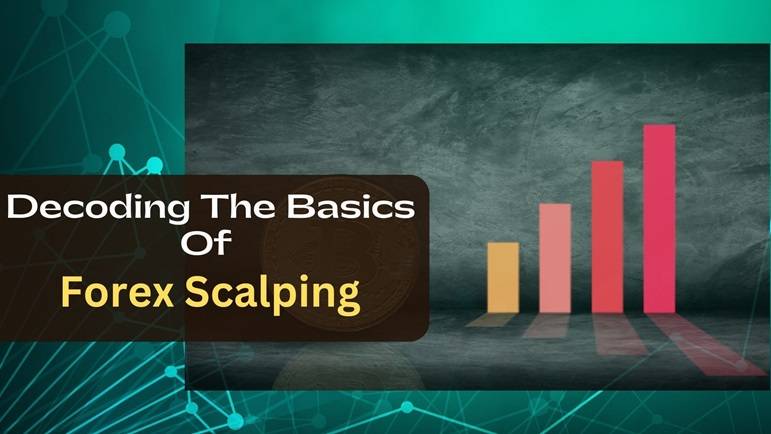Decoding The Basics Of Forex Scalping

Scalping is considered one of the best trading styles you can follow for finding profitable opportunities in the forex market because the frequent fluctuations in exchange rates give ample opportunities for scalpers looking to profit from minor price movements. Now, for those new to the forex world, this article will be a helpful guide as it decodes the basics of scalping and how you can attain success with this strategy.
Meaning of Forex Scalping
Scalping is all about making small profits from the smallest price changes that happen in the trading instruments, which are currency pairs in the context of forex trading. A scalper will always enter and exit multiple trades in a day with the intention of capturing quick pip movements in every trade. These traders use a pip calculator to add up all the pips they have captured in a trading day to determine their overall profits. Scalpers use shorter timeframes, ranging from 1 minute to 15 minutes, and look for short-term trends instead of market sentiment.
Technical analysis is the ultimate guide for scalping, as scalpers always monitor the charts to find ideal trade setups throughout the trading day. Scalping may look like a simple trading style at first, but when you dive deep into it, you can see how much precision and timing are needed to become successful at scalping. Entering and exiting the trades at the right time is the key to making profits as a scalper.
How Does Scalping Work?
The tools scalpers use for trading are tick charts and minute charts, as they are the most dependable chart types for tracking minor price fluctuations in forex pairs. If we look at day trading, which is another short-term trading style, we will see that day traders open fewer trades during the day and close them before the day ends. But scalping is more aggressive as scalpers enter many more trades than day traders but close them during the very same trading session. They simply don’t wait for more than a few minutes, irrespective of the result.
A day trader may still choose to wait if the price does not touch their target levels, but scalpers will focus on exiting the trade and look for another trading opportunity as soon as possible. To keep it short, the goal of scalpers is to execute a good number of trades and make small gains from each of these trades to reach their profit target. If we talk about the profitability of scalping in pips, you will see that most scalpers don’t aim for anything more than 5 or 10 pips as that is enough profit for the risk they take.
Scalpers generally enter trades with smaller position sizes to manage the risk of placing too many trades, and hence, they can still be profitable with the smaller gains they make in each trade. But, they should know how much profit they make; for that, a profit calculator is useful. Just add in a few details to the calculator, and traders will find out the profit they’ve made in their respective base currencies. Each scalper will have a different approach towards the market, as some of them also rely on strategies like news trading, which allows them to take advantage of short-term volatility. Basically, there are no fixed rules for scalping, and you are free to follow different strategies as per your preference.
Scalping Personality
As we mentioned before, timing is the essential skill you need to develop as a scalper. You must be fast enough to spot the ideal opportunities at the right time and make quick trading decisions. Being spontaneous is what gives you an edge as a scalper, but at the same time, you should not get into impulsive trading. There is only a thin line between scalping and over-trading, and you must be able to strike a balance here. You should be prepared to keep your eyes glued to the screen throughout the trading session, as you might miss out on a good trading opportunity in a fraction of a second. So, speed is a key skill for becoming successful at scalping.
Is Scalping similar to Market-making?
You may think of scalping as market-making on a smaller level, as both scalpers and market makers enter and exit trades at a fast pace. But the role of a market maker is very different from that of a scalper. The market maker is someone who adds more liquidity to the market by opening a lot of trade positions as they aim to earn from the spreads. However, a scalper is only playing a minor role in increasing the trading volume or liquidity. They are scalping to make profits from trades and have to pay the spreads to the broker. On the other hand, a market maker is the one earning the spread, and they take advantage of the scalpers who are present in the market.
Requirements for Scalping
- A Cost-effective Broker – Choosing a cost-effective broker is very important for scalping, as brokers charge for every trade that you place. The trading cost will be an issue for the scalper as they enter way too many trades. So, you must pick a broker who promises to provide favourable trading conditions for scalping, including tight spreads and low commissions. You should also check if they support scalping before signing up, as your trading account needs to be free of any restrictions that can interrupt the scalping process. Before going live, I suggest you test the trading conditions by scalping on the broker’s demo account.
- A Sophisticated Trading Platform – The first and foremost requirement for scalping is a fast and stable trading platform, which connects you to the forex market and allows you to trade in solid conditions. Scalping is a fast-paced trading style, so the platform you choose must be compatible with the same.
- Choosing the Best Currency Pairs – As a scalper, you should know that not every currency pair is suitable for scalping. You need pairs with enough trading volume, as liquidity is a key requirement for entering and exiting multiple trades at a fast rate. So, you can’t go for pairs that do not provide enough liquidity to begin with. Major pairs like EUR/USD or USD/JPY would be ideal for scalping as they perfectly fit the criteria.
- Choosing the Best Time to Trade – Another crucial aspect of scalping is the time you choose. Even though the forex market is open round the clock, the liquidity is not the same throughout the day. Being a scalper, you need to be present at the peak market hours to take advantage of the liquidity. So, make sure you are trading the major sessions based on the currency pairs you choose. For instance, if you are planning to trade with EUR/USD, then the session overlap of London and the US is considered the best time for scalping.
- Minimal Slippage – Slippage is a common phenomenon in the forex market, but it creates unfavourable conditions for all traders, especially scalpers. Slippage occurs when your trades are placed and executed at a different price than the original price you quoted for entering or exiting. This can have a negative impact on your trading results and will be a major issue for scalpers. You can’t really avoid slippage fully, but you can ensure minimal slippage by choosing a broker that provides fast execution without too many re-quotes.
Preparation for Scalping in Simple Steps
- Prepare Your Charts – The first thing you need to prepare for scalping is the charts you will use for analysis. Choose the best time frame and add the relevant indicators like Moving Averages, Fibonacci and more based on your trading plan. The proper use of indicators allows you to confirm a trading signal and provide more details about the trade setup that you have chosen.
- Make Calculated Moves – Being a scalper, you don’t have much time to think but should be able to make calculated moves spontaneously. You can use a trading calculator for this purpose, as it performs all key functions quickly and accurately. That way, you can speed up the calculation process and focus on actual trading.
- Can You Scalp Anytime? – Now, one common question asked by beginners is whether they can get started with scalping anytime. Technically, you can trade during major sessions when there is a high volume of trade, but only after devising a solid trading plan and enough preparation. Being mentally prepared is just as important here as scalping is an intense trading style which needs to be done with a lot of focus, discipline and precision.
The Bottom Line
In a nutshell, scalping can be an ideal trading style for anyone with the relevant knowledge and skills to navigate the fast-moving markets easily. Beginners can also try their hands at scalping after systematic learning, planning and practice. Finally, consistency and persistence are also the keys to success for forex scalping.











